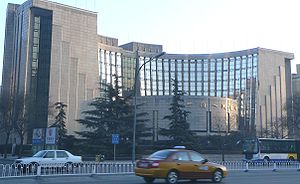| As China’s exporters were hit by the global recession in 2008, the People's Bank of China began stepping up her intervention programme to prevent appreciation of the Yuan. By April 2011 Chinese state controlled banks had accumulated over one trillion in US treasuries and over 1.5 trillion in other dollar assets. China has indicated she plans to further rebalance her economy towards domestic consumption, and intends to stop buying dollar assets by 2016. (Photo credit: Wikipedia) |
A slide in economic activity for seven straight quarters and a view among analysts that growth could be closer to 5 percent by the end of the decade than the near-10 percent it has averaged for the last 30 years, has revived concerns that Beijing faces a Japan-style battle with stagnation.
But analysts say China is hardly a Japan in the making.
Abundant room for greater consumption and wealth, a slow-rising currency, and steps to cool property markets will leave it in good stead to avoid Japan's fate.
"I know as a matter of fact that policymakers in Beijing have looked a lot at Japan," said Louis Kuijs, a former World Bank economist now at the Royal Bank of Scotland. "Japan often comes up in discussions."
Whether China succeeds in avoiding an economic crash depends on how far it can turn its maturing, export-driven economy into one more geared to services and domestic consumption, a transition the World Bank says must happen well before 2030.
Beijing would also have to replace central planning with a market-driven growth model.
If the transformation struggles though, the biggest risk is that China falls back on the housing market for growth, said Tomo Kinoshita, chief economist at Nomura Securities. ... Continue to read.

No comments:
Post a Comment